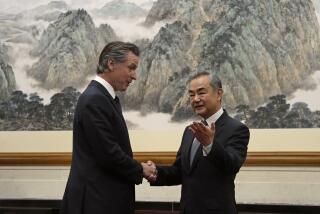Why the new coronavirus will hit the world economy harder than SARS

During the 2003 SARS epidemic, Starbucks barely had 100 stores in China to worry about. The company responded by postponing staff meetings, and pushing stricter hygiene and store-cleaning procedures for employees.
This time around with the new coronavirus outbreak, Starbucks temporarily closed more than half of its now approximately 4,300 outlets in the mainland.
For the record:
2:21 p.m. Feb. 5, 2020A previous version of this story said the ports of Los Angeles and Long Beach have endured 15 months of declining imports. The decline has been in exports.
Qualcomm’s exposure in 2003 was limited to $310 million in sales of chips and telecom products to China. That’s since ballooned to a whopping $11.6 billion last year, or 48% of the San Diego firm’s total revenue, reflecting China’s spectacular rise as a global manufacturing power.
“Our dependence on China has grown over time,” said Bhawnesh Mathur, chief executive of Masterwork Electronics. Today the Chula Vista company counts on 100 Chinese manufacturing facilities to supply printed circuit boards, relays and other components that it sells to major corporations. Every one of them remains closed.
In terms of the full economic toll from the coronavirus, a lot depends on how long the epidemic lasts and when businesses in China reopen. But this much is almost certain: The hit to the U.S. and the rest of the world will be harder than what was felt from SARS 17 years ago, for the simple reason that China’s role in the global economy is so much greater today.
China’s economy today is 8½ times larger than it was in 2003. Trade with the U.S. is nearly four times bigger.
And while China is the second-largest economy behind the United States, the Asian nation — by virtue of its size and faster expansion rate — has been the biggest engine for global growth over much of the last decade.
That’s meant that efforts to wall off China from the rest of the world are already having significant economic effects, depressing energy prices, lowering global growth rate estimates and even raising questions about implementation of the new preliminary U.S.-China trade pact.
China’s large and growing middle class has made the country the biggest source of travelers and a voracious buyer of luxury brands. Chinese tourism to California and other U.S. destinations already had slipped the last two years, thanks to the U.S.-China trade war. Despite the truce last month, those numbers will almost surely keep sliding in the near term as airlines suspend China flights and many Chinese stay home, whether voluntarily or under compulsion.
“The global economy was much more vulnerable to something going off the rails like this virus,” said Mark Zandi, chief economist at Moody’s Analytics. “I think it’s going to do damage. It’s going to change the trajectory of the U.S. and global economy in the first quarter and probably for the year as a whole.”
Zandi estimated that China’s economic growth would fall to 5.4% this year from 6.1% in 2019, with measurable knock-on effects dragging U.S. expansion down to a slow 1.7% and the rest of the world edging closer to recession territory.
Financial markets, understandably, have been wobbling. And as investors and policymakers such as the Federal Reserve try to assess the risks, many have looked at what happened with SARS — short for severe acute respiratory syndrome, which is also caused by a coronavirus — to understand the possible path of the latest pneumonia-like ailment and what it might mean for the economy.
SARS appeared in November 2002 in southern China and the epidemic wasn’t declared over by the World Health Organization until July 2003. There were about 8,000 cases of SARS in two dozen countries that resulted in 774 deaths.
The new coronavirus strain was initially detected in the central Chinese city of Wuhan in December. Beijing imposed a lockdown of Wuhan on Jan. 23, and has since quarantined much of Hubei province, affecting more than 50 million people.
In Wuhan and elsewhere in China, even faraway cities in the northeast, public transportation has been halted. Factories, stores, restaurants, theaters and other public places have closed or are eerily empty. And business owners, workers and customers remain in limbo as Chinese hospitals are overrun with patients and government officials scurry to contain the outbreak.
On Wednesday in Beijing, Chinese authorities reported that the virus has sickened more than 24,000 people in China and two dozen other countries, killing nearly 500. There have been 11 reported cases in the United States, with no fatalities.
The good news is that it’s not looking as lethal as SARS. Companies aren’t taking any chances, however. Apple, McDonald’s and KFC, which has more stores in China than in the U.S., are among the companies that have closed some China operations for now. Many others including Microsoft and Facebook have banned China travel and moved to evacuate workers from Wuhan.
“If American companies continue to stay shut, if we have this continued isolation, that could be a problem,” said Jack Ablin, chief investment officer of Cresset Capital in Chicago.
China today is the largest market for cars, cellphones, computers and many other goods. As Chinese consumers cut back, U.S. corporate profits could take a dive, which could hammer stocks and in turn weaken consumer spending. “The question is, does it take growth out of earnings?” Ablin said.
That goes for many commodities too. China surpassed the United States as the largest importer of petroleum in 2016, and it “was one of the few places where demand was still growing at the end of last year,” said Amy Myers Jaffe, an expert on global energy policy at the Council on Foreign Relations.
But global crude prices have sunk in recent days amid China’s expected pullback in oil demand, prompting Saudi Arabia to push for production cuts. Lower oil prices could weaken drilling activity and investments in the United States.
Eugene Seroka, executive director of the Port of Los Angeles, was working in Shanghai for a liner shipping company during the SARS epidemic. He remembered people in China being as fearful then as today, particularly because of the opacity from Chinese authorities. Yet on trade activity overall, he said, the effect from SARS was mostly “negligible.”
In the ensuing period, China’s exports have grown exponentially as it joined the World Trade Organization in 2001 and became the world’s factory floor. In 2012, China overtook the United States as the largest goods-trading nation.
Today a little more than 50% of all ships and cargo entering the ports of Los Angeles and Long Beach arrive from China. The two ports are the busiest in the nation, but already have endured some 15 months of declining exports amid the Trump administration’s trade war with China.
Seroka had hoped the signing of an initial U.S.-China trade deal last month would help boost cargo traffic. Now he’s not so sure.
In the so-called Phase One trade agreement, China promised to buy at least $200 billion of American goods and services over the next two years, but the text also allows for delays if there’s a “natural disaster or other unforeseeable event.”
“I think those commitments were not especially credible to start with — and they become much less so” with this outbreak, said Phil Levy, chief economist at Flexport, a San Francisco freight shipment and customs brokerage company.
Recalling his time as a senior economist on trade in the George W. Bush White House in 2003, Levy said he “barely remembered [SARS] being a topic of conversation at all.” Today’s a different story.
“There’s huge uncertainty of when this gets under control,” Levy said. “I think the thing that has been most telling have been moves by the airlines. They went in there early and aggressively cut back schedules.”
American Airlines and United, among others, have halted flights to and from China through March 28. Delta’s suspension is through the end of April. Along with passengers, international flights move a lot of cargo too.
The magnitude of China’s growth and its powerful influence in the global economy was evident to economist Shawn DuBravac this week as he was making the rounds at the IPC APEX show in San Diego.
The expo brings thousands of buyers under one roof, and the buzz on the floor was the coronavirus crisis.
Even with U.S. tariffs and the push by some in the Trump administration to encourage a divestment from China, the linkages remain very extensive and complex, DuBravac said.
“Despite that political momentum towards decoupling that’s been in place the last three years, there’s still really strong reliance on components and inputs from China,” he said.
More to Read
Get the L.A. Times Politics newsletter
Deeply reported insights into legislation, politics and policy from Sacramento, Washington and beyond. In your inbox three times per week.
You may occasionally receive promotional content from the Los Angeles Times.







